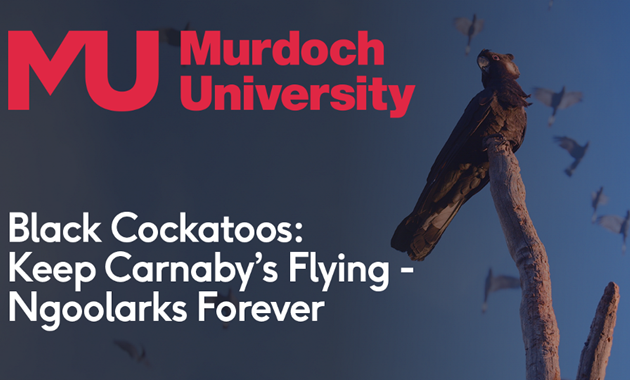We hope the Keep Carnaby's Flying - Ngoolarks Forever project's collaborations among local governments, NGOs and Friends of Bushland groups will continue beyond the initial two-year project, with ongoing revegetation and rewilding activities to provide new Carnaby's cockatoo food and habitat every year.
We also hope this project will enable other councils and Friends groups to access this website's resources, reach out to the founding NGO groups, and take action to safeguard their local black cockatoos.
Local governments may also be interested to contact our black cockatoo team at Murdoch University to discuss the development of their own black cockatoo Conservation Action Plan.
To date, Keep Carnaby’s Flying – Ngoolarks Forever activities have included:
Working with local governments to protect their Ngoolarks
In the project’s two-year ignition stage, we used our black cockatoo tracking data and information from our partner NGOs to identify eight Local Government Authorities in which to undertake on-ground action, including revegetation to provide Ngoolarks with fast-growing food species to help meet immediate food needs, and installation of ‘Cockitrough’ bird waterers to help prevent heat stress.
Community partnerships for on-ground action
Our project has supported close working partnerships for on-ground action among key community groups, including 'umbrella' sustainability NGOs, local-level Friends of Bushland groups and Aboriginal rangers.
Working with Kaarakin Black Cockatoo Conservation Centre and Perth Zoo
Kaarakin Black Cockatoo Conservation Centre provides a successful rehabilitation program, treating and returning black cockatoos to the wild, following initial veterinary assessment and treatment of these birds at Perth Zoo. We are using the health and husbandry records of both organisations in a large-scale epidemiological study to identify health threats in the urban landscape, such as hotspots for vehicle strike, and any changes over time in the nature of clinical cases (debilitated birds brought in for veterinary treatment). This will help us to identify and manage urban threats to Ngoolarks, and support the rehabilitation program.
Providing local governments with black cockatoo Conservation Action Plans
To help Local Governments protect their Ngoolarks, we have developed individual black cockatoo Conservation Action Plans for several councils, informed by science including our black cockatoo tracking data and locations of roost sites in each locality. The Plans provide each council with a blueprint for conservation of black cockatoos in their specific area, over the short, medium and long-term. We are keen to produce Conservation Action Plans for more Local Governments as funding allows.
Community outreach and awareness-raising in schools
Our project, with Kaarakin Black Cockatoo Conservation Centre and our Cultural Engagement Lead from Murdoch University, has delivered community outreach to specific schools and community groups in the project’s selected local government areas, with a focus on black cockatoo conservation and the cultural significance of these endangered birds for Noongar people. School presentations have included bringing an ‘educational ambassador’ black cockatoo (a bird that cannot be released due to injury and is accustomed to public outreach activities) for students to observe up close, while promoting revegetation activities. We have also curriculum-aligned black cockatoo-themed Educational Resources for use in schools, including prepared lessons on Ngoolarks and their conservation. These educational resources are available on this website.
What are Ngoolarks eating in urban landscapes?
Dietary profiles using eDNA
During the initial two years, this project explored what Ngoolarks are eating in different seasons, in partnership with the Trace and Environmental DNA (TrEnD) laboratory at Curtin University. Analysis of environmental DNA samples, collected from night roosts in selected local government areas over different seasons, is helping identify important food plants and give us a seasonal ‘botany of forage’ in each locality, to guide planting decisions.
